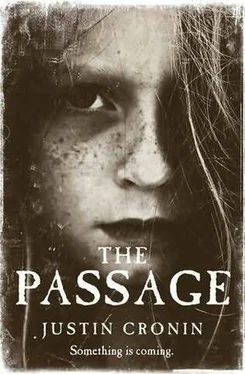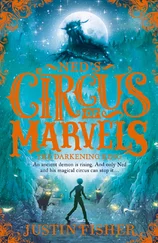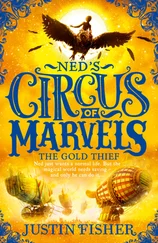They were almost through Banning now. He was glad he couldn’t make out much in the way of detail, but the glimpses he got as they rode through town-you couldn’t not look-creeped him to the bone. A bunch of caved-in buildings and dried-out slims roasting in their cars like strips of mutton, never mind the smokes, who were probably skulking around somewhere. One shot. They come from above . The Watch drilled those words into your head from the time you were eight years old, never once letting you in on the big secret, what nonsense it all was. If a smoke dropped down on Galen Strauss, he wouldn’t stand a chance. He wondered how much it would hurt. Probably a lot.
The truth was, the way things were, the whole Mausami thing finally felt over. He wondered why he hadn’t seen that before. Well, maybe he had and just hadn’t been able to bring himself to accept it. He didn’t even feel angry. Sure, he had loved her. Probably he still did. There would always be a place in his mind where Mausami was, and the baby, too. The baby wasn’t his, but still he found himself wishing it were. A baby could make you feel better about just about anything, even going blind. He wondered if Maus and the baby were okay. If he found them, he hoped that he’d be man enough to say that. I hope that you’re okay.
They approached the ramp to the Eastern Road, riding in two lines. Flyers, his fucking head was pounding. Maybe it was just the knock Alicia had given him, but he didn’t think so. His whole vision seemed to be collapsing. Funny motes of light had begun to dance in his eyes. He felt a little sick.
He was so wrapped up in his thoughts he didn’t realize where he was, that he’d reached the top of the ramp. He paused to take a drink. The turbines were out there, somewhere, spinning in the wind that was pushing into his face. All he wanted was to get to the station and lie down in the dark and close his eyes. The dancing specks were worse now, descending through his narrowed field of sight like a glowing snowfall. Something was really wrong. He didn’t see how he would be able to continue; someone else would have to take the point. He turned to Dale, who had moved up behind him, saying, “Listen, do you think-”
The space beside him was empty.
He swiveled in his saddle. No one was behind him. Not one rider. Like a giant hand had plucked them, mounts and all, right off the face of the earth.
A wave of bile rose in his throat. “Guys?”
That was when he heard the sound, coming from beneath the overpass. A soft, wet ripping, like sheets of damp paper being torn in half, or the skin being pried off an orange fat with juice.
They made Joshua Valley with just minutes to spare; by the time they reached the fire station, the light was nearly gone. The station was located on the western edge of town, a squat, square structure with a concrete roof and a pair of arched doors facing the street, sealed with cement blocks. Hollis led them to the rear, where the water tank sat in a thicket of tall weeds. The water that poured from the pump was warm and tasted of rust and earth. They all drank greedily, dumping great cascades over their heads. Never had water tasted so good, Peter thought.
They gathered in the shade of the building while Hollis and Caleb pried loose the boards that covered the back entrance of the station. With a shove the door spilled open on its rusted hinges, exhaling a wash of trapped air as dense and warm as human breath. Hollis took up his rifle again.
“Wait here.”
Peter listened to Hollis’s echoing footsteps moving through the dark space within. He was strangely unconcerned; they had come this far, it seemed impossible that the fire station would refuse them shelter for the night. Then Hollis returned.
“All clear,” he said. “It’s hot, but it’ll do.”
They followed him into a large, high-ceilinged room. The windows were sealed by more concrete blocks, with narrow slits at the top for ventilation, through which issued a yellow-tinted glow of fading daylight. The air smelled of dust and animals. A miscellaneous assemblage of tools and building supplies was pushed against the walls: sacks of concrete, plastic troughs and hoes encrusted with cement, a wheelbarrow, coils of rope and chain. The bays where the engines had once been were empty. Now the area served as a makeshift stable, with half a dozen stalls and tack hung on the boards. Along the far wall, a flight of wooden stairs ascended into nothing-the second floor was gone.
“Cots in the back,” Hollis explained. He had knelt to fill a lantern from a plastic jug. Peter saw the liquid’s pale golden color and recognized the smell. Not alcohol: petroleum. “All the comforts of home. There’s a kitchen and bath, too, though there’s no running water and the chimney’s sealed.”
Alicia was leading the horse inside. “What about this door?” she asked.
Hollis lit the lantern with a match, paused to adjust the wick, and passed it to Mausami, who was standing beside him. “Hightop, give me a hand.”
Hollis retrieved a pair of wrenches and passed one to Caleb. Hanging from the joists over the front entrance, suspended by a pair of blocked chains, was a barricade of thick metal plates, framed by heavy timbers. They lowered it into position and bolted it to receivers set in the jamb, sealing themselves inside.
“Now what?” Peter asked.
The big man shrugged. “Now we wait till morning. I’ll take first watch. You and the others should sleep.”
In the back room were the cots Hollis had spoken of, a dozen mattresses on sagging springs. A second door led to the kitchen and bathroom, with a row of rust-stained sinks below a cracked mirror and four toilet stalls. All of the windows were sealed. One of the toilets had been pulled out and now sat, its bowl tipped forward like the face of a drunken man, in the far corner of the room. In its place was a plastic bucket and, on the floor beside it, a pile of old magazines. Peter picked up the top one: Newsweek . On the cover was a blurry photo of a viral. There was something oddly flattened about the image, as if it had been taken from a great distance and very close at the same time. The creature was standing in some sort of alcove, in front of a device with the letters ATM written at the top. Peter didn’t know what this was, though he’d seen one like it in the mall. On the ground behind the viral lay a single, empty shoe. The two-word caption said, BELIEVE IT.
He returned with Alicia to the garage. “Where are the rest of the supplies?” he asked Hollis.
Hollis showed him where the floorboards lifted up, revealing a recess about a meter deep, its contents covered by a heavy plastic tarp. Peter dropped down and pulled the tarp free. More jugs of fuel and water and, packed tightly together, rows of crates like the ones they’d found under the stairs at the power station.
“These ten here are more rifles,” Hollis said, pointing. “Pistols over there. We only moved the smaller weapons, and no explosives. Demo didn’t know if maybe they’d just blow up on their own and wreck the place, so we left them in the bunker.”
Alicia had opened one of the crates, removing a black pistol. She pulled the slide, sighted down the barrel, and squeezed the trigger; they heard the sharp click of the hammer falling on an empty chamber. “What kind of explosives?”
“Grenades, mostly.” Hollis tapped one of the crates with the toe of his boot. “But the real surprise is this one here. Give me a hand.”
The others had gathered around the hole. Hollis and Alicia stood on either side of the locker and hoisted it to the floor of the garage. Hollis knelt and opened it. Peter had expected more weaponry, so he was surprised to see a collection of small gray pouches. Hollis handed one to Peter. It weighed barely a kilo; on one side was a white label, covered with tiny black writing. At the top were the letters MRE.
Читать дальше












